Top Rankings
RSU 17/MSAD 17 School District ranks among the top 20% of public school district in Maine for:
Category
Attribute
Community Size
Largest student body (number of students) (Top 1%)
For the 2025 school year, there is 1 public middle school serving 507 students in RSU 17/MSAD 17 School District. This district's average middle testing ranking is 1/10, which is in the bottom 50% of public middle schools in Maine.
Public Middle School in RSU 17/MSAD 17 School District have an average math proficiency score of 72% (versus the Maine public middle school average of 82%), and reading proficiency score of 71% (versus the 85% statewide average).
Minority enrollment is 9% of the student body (majority Hispanic), which is less than the Maine public middle school average of 13% (majority Black and Hispanic).
Overview
This School District
This State (ME)
# Schools
10 Schools
205 Schools
# Students
3,172 Students
54,742 Students
# Teachers
254 Teachers
5,171 Teachers
Student : Teacher Ratio
12:1
12:1
District Rank
RSU 17/MSAD 17 School District, which is ranked within the bottom 50% of all 191 school districts in Maine (based off of combined math and reading proficiency testing data) for the 2021-2022 school year.
The school district's graduation rate of 81% has stayed relatively flat over five school years.
Overall District Rank
#187 out of 222 school districts
(Bottom 50%)
(Bottom 50%)
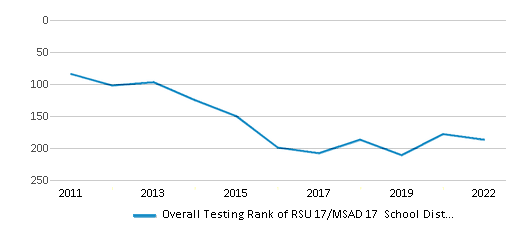
Math Test Scores (% Proficient)
72%
82%
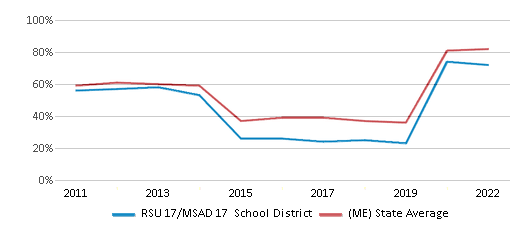
Reading/Language Arts Test Scores (% Proficient)
73%
84%
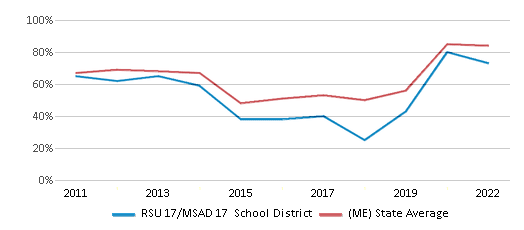
Science Test Scores (% Proficient)
23%
37%
Graduation Rate
81%
86%
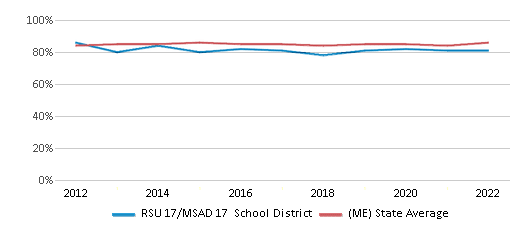
Students by Ethnicity:
Diversity Score
0.15
0.24
# American Indian Students
13 Students
675 Students
% American Indian Students
n/a
1%
# Asian Students
23 Students
618 Students
% Asian Students
1%
1%
# Hispanic Students
86 Students
1,735 Students
% Hispanic Students
3%
3%
# Black Students
24 Students
1,973 Students
% Black Students
1%
4%
# White Students
2,922 Students
47,794 Students
% White Students
92%
87%
# Hawaiian Students
1 Student
42 Students
% Hawaiian Students
n/a
n/a
# Two or more races Students
103 Students
1,905 Students
% of Two or more races Students
3%
4%
Students by Grade:
# Students in PK Grade:
125
887
# Students in K Grade:
200
1,595
# Students in 1st Grade:
204
1,641
# Students in 2nd Grade:
224
1,729
# Students in 3rd Grade:
216
1,772
# Students in 4th Grade:
222
1,949
# Students in 5th Grade:
222
4,404
# Students in 6th Grade:
233
10,295
# Students in 7th Grade:
255
12,554
# Students in 8th Grade:
252
12,727
# Students in 9th Grade:
239
1,281
# Students in 10th Grade:
258
1,292
# Students in 11th Grade:
253
1,376
# Students in 12th Grade:
269
1,240
# Ungraded Students:
-
-
District Revenue and Spending
The revenue/student of $16,221 in this school district is less than the state median of $21,600. The school district revenue/student has stayed relatively flat over four school years.
The school district's spending/student of $16,570 is less than the state median of $21,191. The school district spending/student has stayed relatively flat over four school years.
Total Revenue
$52 MM
$3,617 MM
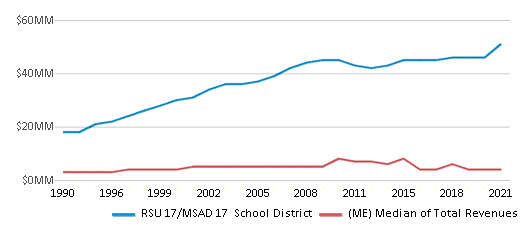
Spending
$53 MM
$3,549 MM
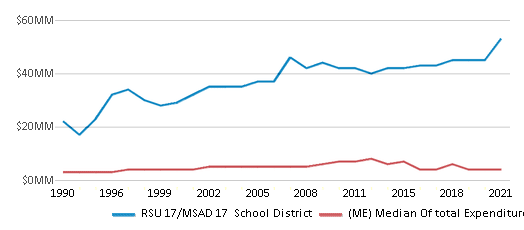
Revenue / Student
$16,221
$21,600
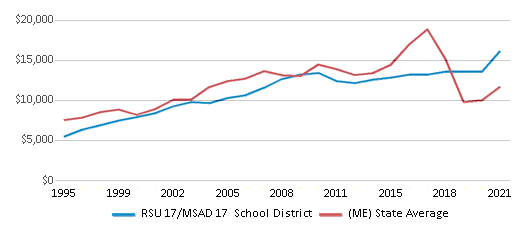
Spending / Student
$16,570
$21,191
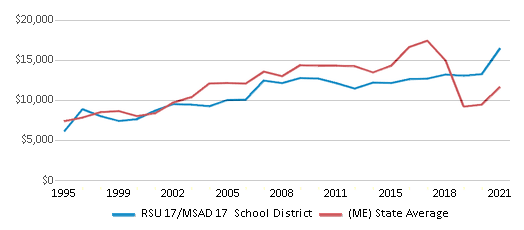
Best RSU 17/MSAD 17 School District Public Middle Schools (2025)
School
(Math and Reading Proficiency)
(Math and Reading Proficiency)
Location
Grades
Students
Rank: #11.
Oxford Hills Middle School
(Math: 72% | Reading: 71%)
Rank:
Rank:
1/
Bottom 50%10
100 Pine Street
Paris, ME 04271
(207) 743-5946
Paris, ME 04271
(207) 743-5946
Grades: 7-8
| 507 students
Recent Articles

Sexual Harassment at Age 6: The Tale of a First Grade Suspension
A six-year old in Aurora, Colorado, was suspended after singing an LMFAO song to a little girl in his class and reportedly “shaking his booty.” We look at the case and the sexual harassment problem in public schools today.

How Scaffolding Could Change the Way Your Child Learns
This article explores the concept of instructional scaffolding, a teaching method that enhances learning by breaking down complex tasks into manageable parts. It highlights how scaffolding supports students in developing critical thinking skills and becoming more independent learners. The article discusses the benefits of scaffolding, including improved engagement and reduced anxiety, and provides strategies for its implementation across various educational levels.

February 05, 2025
Understanding the U.S. Department of Education: Structure, Impact, and EvolutionWe explore how the Department of Education shapes American education, from its cabinet-level leadership to its impact on millions of students, written for general audiences seeking clarity on this vital institution.





